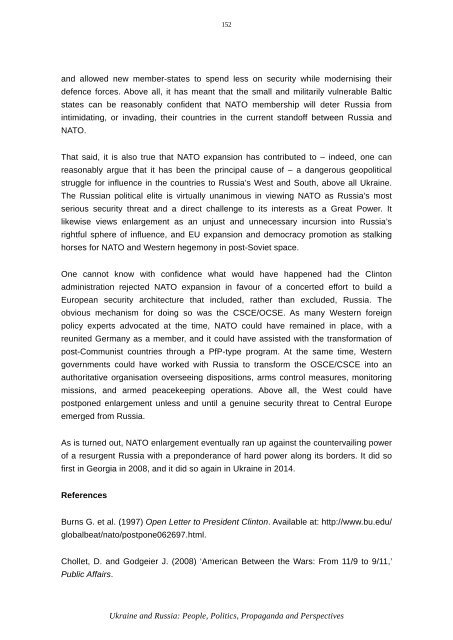Ukraine-and-Russia-E-IR
Ukraine-and-Russia-E-IR
Ukraine-and-Russia-E-IR
You also want an ePaper? Increase the reach of your titles
YUMPU automatically turns print PDFs into web optimized ePapers that Google loves.
152<br />
<strong>and</strong> allowed new member-states to spend less on security while modernising their<br />
defence forces. Above all, it has meant that the small <strong>and</strong> militarily vulnerable Baltic<br />
states can be reasonably confident that NATO membership will deter <strong>Russia</strong> from<br />
intimidating, or invading, their countries in the current st<strong>and</strong>off between <strong>Russia</strong> <strong>and</strong><br />
NATO.<br />
That said, it is also true that NATO expansion has contributed to – indeed, one can<br />
reasonably argue that it has been the principal cause of – a dangerous geopolitical<br />
struggle for influence in the countries to <strong>Russia</strong>’s West <strong>and</strong> South, above all <strong>Ukraine</strong>.<br />
The <strong>Russia</strong>n political elite is virtually unanimous in viewing NATO as <strong>Russia</strong>’s most<br />
serious security threat <strong>and</strong> a direct challenge to its interests as a Great Power. It<br />
likewise views enlargement as an unjust <strong>and</strong> unnecessary incursion into <strong>Russia</strong>’s<br />
rightful sphere of influence, <strong>and</strong> EU expansion <strong>and</strong> democracy promotion as stalking<br />
horses for NATO <strong>and</strong> Western hegemony in post-Soviet space.<br />
One cannot know with confidence what would have happened had the Clinton<br />
administration rejected NATO expansion in favour of a concerted effort to build a<br />
European security architecture that included, rather than excluded, <strong>Russia</strong>. The<br />
obvious mechanism for doing so was the CSCE/OCSE. As many Western foreign<br />
policy experts advocated at the time, NATO could have remained in place, with a<br />
reunited Germany as a member, <strong>and</strong> it could have assisted with the transformation of<br />
post-Communist countries through a PfP-type program. At the same time, Western<br />
governments could have worked with <strong>Russia</strong> to transform the OSCE/CSCE into an<br />
authoritative organisation overseeing dispositions, arms control measures, monitoring<br />
missions, <strong>and</strong> armed peacekeeping operations. Above all, the West could have<br />
postponed enlargement unless <strong>and</strong> until a genuine security threat to Central Europe<br />
emerged from <strong>Russia</strong>.<br />
As is turned out, NATO enlargement eventually ran up against the countervailing power<br />
of a resurgent <strong>Russia</strong> with a preponderance of hard power along its borders. It did so<br />
first in Georgia in 2008, <strong>and</strong> it did so again in <strong>Ukraine</strong> in 2014.<br />
References<br />
Burns G. et al. (1997) Open Letter to President Clinton. Available at: http://www.bu.edu/<br />
globalbeat/nato/postpone062697.html.<br />
Chollet, D. <strong>and</strong> Godgeier J. (2008) ‘American Between the Wars: From 11/9 to 9/11,’<br />
Public Affairs.<br />
<strong>Ukraine</strong> <strong>and</strong> <strong>Russia</strong>: People, Politics, Propag<strong>and</strong>a <strong>and</strong> Perspectives


